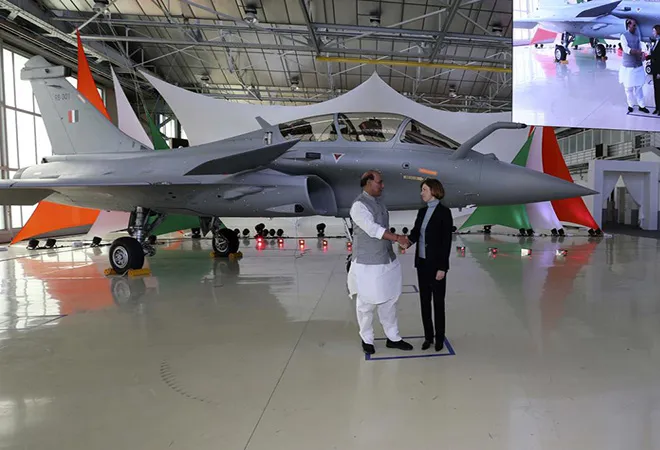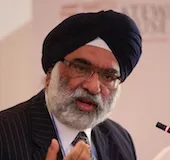-
CENTRES
Progammes & Centres
Location

India and France both have well established engagements with Africa. While France has continued its postcolonial linkages, India has engaged Africa in a well-recognised model of cooperation. Due to the pandemic, the issues of debt and economic stress have emerged with greater impact.
There are adequate reasons to reformulate aspects of engagement with Africa. Among these is trilateral cooperation among likeminded countries that contribute to African development, and possibly retrieve some of the ground lost to China. The idea of trilateral cooperation is currently widely accepted, but its implementation requires specific bilateral arrangements and involvement of development agencies, companies and funds on either side. This commentary seeks to set out some ideas, which could possibly contribute to the development of a potent India-France partnership for African development.
India and France have had a dialogue on Africa since June 2017. The second edition was in December 2018. The third edition may take place this year. The dialogue seeks to develop cooperative synergies between India and France to seek a developmental compact keeping African preferences in view.
India and France have had a dialogue on Africa since June 2017. The second edition was in December 2018. The third edition may take place this year. The dialogue seeks to develop cooperative synergies between India and France to seek a developmental compact keeping African preferences in view.
France has among the most diverse socio-economic, strategic, academic, cultural and technology relationships with African countries. Twenty nine African countries are French speaking and dominate the membership of the African Union. Nearly 100 million people in Africa speak French. The engagement of France, with its former colonies, is more intense, though not always devoid of problems. The Commonwealth link is less empowered than the linkages established through the Francophonie, 29 of whose 88 members are African. France provides 8 percent of FDI into Africa and its trade of US $55 billion is the largest within the European Union. French Official Development Assistance (ODA) targets 18 African countries. In 2020, 39 percent of France’s bilateral ODA went to Africa (€3.6 billion), 80 percent of which (€2.9 billion) was to sub-Saharan Africa.
Under President Macron, Africa receives more attention. He has tried to reach out to countries outside the French sphere of influence. Most recently, his visits to Rwanda and South Africa are notable. France is playing a continental role in Africa. France too recognises that China has overtaken it as an economic partner, even in African countries where France has traditionally been the main partner. France needs to demonstrate the revitalisation of its multi-faceted partnership with the continent. India has a focus on Africa with its demand based, unconditional and Human Resource Development-based approach.
India and France can collaborate to deepen their impact on African development. Their partnership can lower the costs of development projects and doing business, which can provide viable alternatives to the growing intervention of China. This can keep in view the more liberal, democratic and pluralistic attributes of the two partners. A congruence of development priorities is feasible as France caters to education and professional training, healthcare and climate change. India’s wide cooperation prioritises these sectors.
India and France can collaborate to deepen their impact on African development. Their partnership can lower the costs of development projects and doing business, which can provide viable alternatives to the growing intervention of China. This can keep in view the more liberal, democratic and pluralistic attributes of the two partners
India has deeper penetration through LoCs into 41 African countries. However, its development projects often don’t get implemented in French-speaking countries. This provides an opportunity to cooperate with France in its target countries. The 18 countries are Benin, Burkina Faso, Burundi, Central African Republic, Chad, Comoros, Democratic Republic of the Congo, Djibouti, Ethiopia, Gambia, Guinea, Liberia, Madagascar, Mali, Mauritania, Niger, Senegal and Togo. Ethiopia and Senegal have been efficient partners of India at G2G and at the private levels. Comoros, Djibouti and Madagascar are overlapping with India’s Indo-Pacific policy. The other countries are mostly where Indian efforts fructify slowly. Working with France as a partner in those can raise the efficacy of trilateral cooperation to the benefit of African partners.
Africa’s development partners need to deal with Africa’s surging young population, pandemics, urbanisation and development There is apprehension that the pandemic could push about 40 million people into poverty in Sub Saharan Africa, creating income inequalities, which may negate the possible gains from the Africa Continental Free Trade Area (AfCFTA). Most African countries facing the pandemic do not have the capacity for fiscal stimulus. They are seeking debt rescheduling if not cancellation. Rising levels of debt are stressing African economies.
These concerns are addressed by India and France through G20 efforts. India has rolled over some debt payments and is considering some rescheduling of its US $11 billion loans to African countries. France convened a Summit on Financing African Economies on 18 May around which it wrote off US $5 billion of Sudan’s debt and focused on new ways to finance African development. Healthcare, debt alleviation and economic rejuvenation were supported. The call was for creating programmes keeping African plans and views in mind. This is what India has done well. In consultation with Africa, India and France need to develop less onerous programmes using ODA grants and FDI as the main vehicle of support.
A CII report on trilateral cooperation in Africa proposed that India could collaborate with willing partners for projects under their various schemes in areas where there were substantive gaps in India’s compact. The development agencies of India and France could jointly undertake grant projects in focus countries. This could fulfil the priorities of French -speaking African countries, where India has limited engagement. These could include Chad, Guinea, Togo, Benin and Mali on priority. Comoros and Madagascar in the Indian Ocean Region would be important too. Through a joint discussion with African governments, chambers of commerce and local development partners, India and France can build such institutions
Capacity building institutions, which India had introduced under the IAFS process, were agreed upon during the 2018 State visit of Macron to India. Institutes for entrepreneurship development, vocational training and ICT (some of which India has successfully implemented in different parts of Africa) could be jointly implemented. France could facilitate the budget and infrastructure costs that India expected the host country to bear. India could implement the soft infrastructure, equipment, and training manuals. Success will ensue if these could be tied with existing industries, for whom these institutions could train human resources for absorption. Such backward integration and business plans are imperative for successful projects and are the weak link in Indian efforts. French companies that are present in Africa could provide this sustainability.
Trilateral partnerships will succeed best beyond G2G efforts if B2B relations create synergies. The India- EU connectivity partnership includes Africa as an area of collaboration with a value-based approach, which will give Africa better value for the money expended. India and France could use this for relevant connectivity projects and counter the Chinese narrative.
Trilateral partnerships will succeed best beyond G2G efforts if B2B relations create synergies. The India- EU connectivity partnership includes Africa as an area of collaboration with a value-based approach, which will give Africa better value for the money expended. India and France could use this for relevant connectivity projects and counter the Chinese narrative.
French companies implementing large projects could benefit by collaborating with Indian companies, who could reduce the cost of the project by bringing in cost efficient services. A power plant could benefit from lower cost of transmission lines by Indian companies. This would require contractor–subcontractor relationships. Since procurement systems are varied and difficult to correlate, projects can be segmented. India has US $1.5 billion on offer for two step loans through the EBID. This is for projects in West Africa. This offers Indian financing for joint ventures with African and French companies in West Africa.
The effort should be to have more PPP-led projects, rather than burdensome loans for Africa. For instance, EPI and Crompton Greaves signed JVs with French companies in 2016 for projects in India. These can be taken to Africa too. A more cohesive B2B approach between India and France needs encouragement. This is the most difficult part of trilateral cooperation, and India and France need to establish this connectivity between companies to take this idea forward.
India and France could do well together in pursuit of the Sustainable Development Goals, particularly through the International Solar Alliance (ISA). Bringing clean and green energy to African countries can resolve several socioeconomic issues. India and France jointly promoted the ISA headquartered in India. Nearly 45 percent of its members are from Africa. India earmarked US $2 billion of its LoCs for Africa for solar projects. India and France can establish a hybrid grant and loan model with confirmed PPAs to establish an alternative financing model for promoting the objectives of the ISA. This will impact cooperation with Africa.
Since 2018 the Sustainable Renewables Risk Mitigation Initiative (SRMI) exists with the World Bank, AfD and ISA as partners. This mobilised over US $350 million for green projects in Africa. Though France is a co-founder with India of the ISA, its commitment has been more vocal than substantial. It recently contributed US $1 million to the ISA after six years. Its contribution to the Green Climate Fund is larger. ISA activities as in the solar park in Mali have not attracted much French support. However, AfD invested €380 million in Africa, to install 650 MW of solar plants. As French energy companies overcome their hesitation on renewables, Total has rebranded itself as TotalEnergies under shareholder pressure. It is imperative that the Indo-French vision of the ISA leads to substantive implementation in Africa.
A good way forward will be to expand the Indo-French Dialogue by including Chambers and development agencies to join the discussion in a practical manner.
The views expressed above belong to the author(s). ORF research and analyses now available on Telegram! Click here to access our curated content — blogs, longforms and interviews.

Gurjit Singh has served as Indias ambassador to Germany Indonesia Ethiopia ASEAN and the African Union. He is the Chair of CII Task Force on ...
Read More +